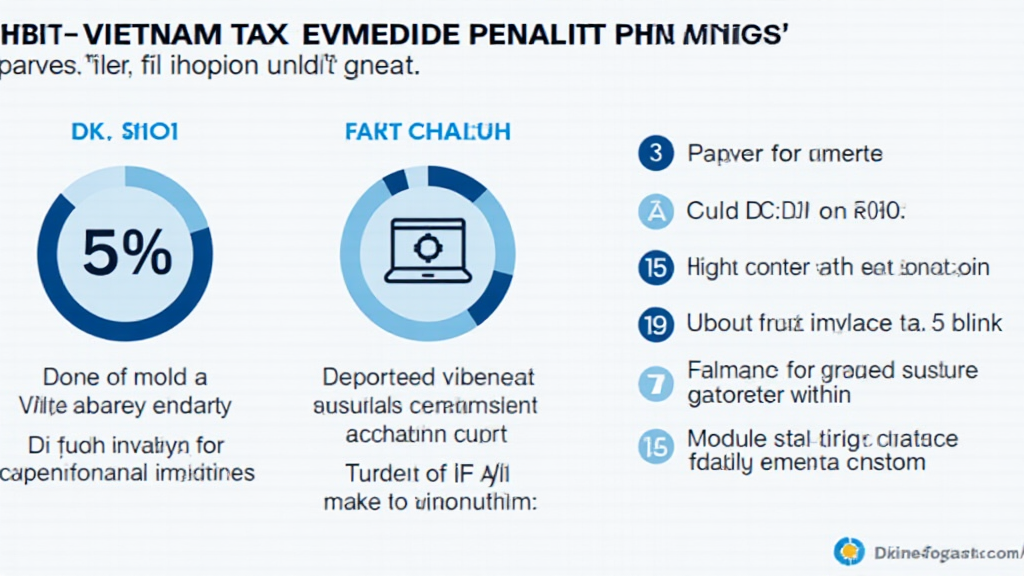HIBT Vietnam Tax Evasion Penalties: Understanding the Consequences
With an estimated $4.1B lost to DeFi hacks in 2024, it’s crucial for crypto investors in Vietnam to understand the risks associated with tax evasion. The landscape of cryptocurrencies is continuously evolving, and so are the laws surrounding them. As Vietnam embraces digital assets, the penalties for tax evasion have become increasingly stringent, dictated by frameworks like HIBT. This article aims to highlight the potential consequences of failing to comply with tax obligations in Vietnam, particularly for those involved in trading and investing in cryptocurrencies.
A Quick Overview of HIBT and Its Importance
The term HIBT represents the Harmonized International Blockchain Taxation, a framework that Vietnam has adopted to regulate the burgeoning cryptocurrency market. As digital currencies become more prominent, the tiêu chuẩn an ninh blockchain (blockchain security standards) are integral in ensuring that investors comply with tax regulations.
Recent statistics indicate that Vietnam’s cryptocurrency user growth rate is one of the highest in Southeast Asia, making it imperative for authorities to set strict regulations to manage this vibrant market.

What Constitutes Tax Evasion in the Crypto World?
Tax evasion involves illegal practices to prevent paying taxes owed. In the context of cryptocurrencies, this may include:
- Failing to report crypto earnings on tax returns.
- Misclassifying crypto transactions.
- Using offshore accounts to hide crypto wealth.
Similar to hiding cash in a bank vault, neglecting your tax responsibilities could lead to serious repercussions under HIBT.
Potential Penalties for Tax Evasion in Vietnam
The penalties for tax evasion can be severe. Under HIBT regulations, offenders may face:
- Financial Penalties: Fines can reach up to 300% of the tax owed.
- Imprisonment: Violators may be sentenced to up to 3 years in prison, especially in cases of fraudulent activity.
- Confiscation of Assets: The government can seize assets linked to tax evasion.
Real-World Examples and Case Studies
According to a report from hibt.com, recent enforcement actions have revealed striking cases of tax evasion among Vietnamese crypto traders, emphasizing the real risks involved. In one notable case, an investor was fined VND 1 billion for failing to report earnings derived from cryptocurrency trading.
How to Ensure Compliance with HIBT Regulations
Ensuring compliance is crucial for avoiding penalties. Here are some effective strategies:
- Keep Accurate Records: Document all transactions, including purchases, sales, and conversions.
- Educate Yourself: Stay informed about updates in HIBT and how they affect your obligations.
- Consult Professionals: Seek guidance from tax advisors who specialize in cryptocurrencies.
2025’s Crypto Tax Landscape: What to Expect
Looking forward, the tax landscape for cryptocurrencies in Vietnam will likely continue to evolve. Understanding nuanced regulations and preparing for future changes, such as potential increases in penalties, is critical for crypto investors.
Conclusion: Protecting Yourself from HIBT Vietnam Tax Evasion Penalties
Investing in cryptocurrencies can be rewarding but also comes with significant responsibilities. Being proactive about your tax obligations under HIBT will mitigate the risk of facing harsh penalties including hefty fines, imprisonment, or asset confiscation. Make tax compliance a priority to protect your financial assets and maintain a responsible investment stance in Vietnam’s vibrant crypto market.
For more detailed insights on navigating tax regulations in the crypto sphere, visit bobscoinsonline.



